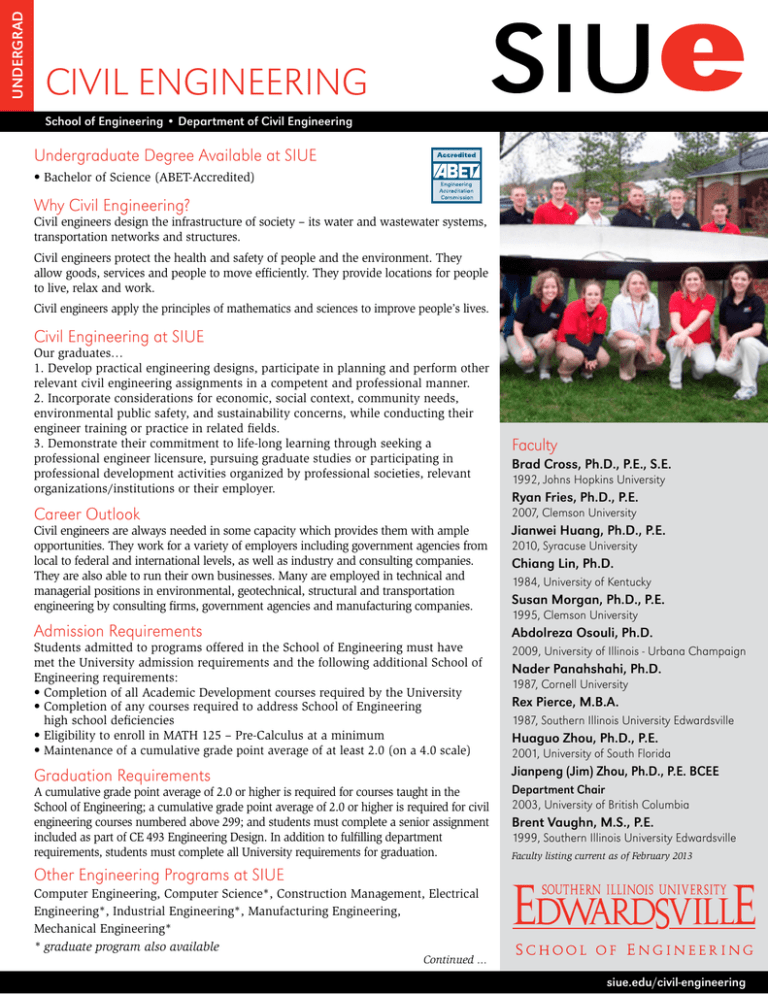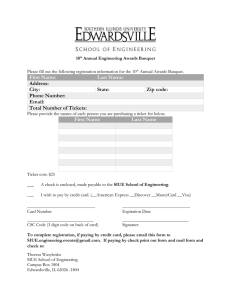civil engineering - Southern Illinois University Edwardsville
advertisement

UNDERGRAD CIVIL ENGINEERING School of Engineering • Department of Civil Engineering Undergraduate Degree Available at SIUE • Bachelor of Science (ABET-Accredited) Why Civil Engineering? Civil engineers design the infrastructure of society – its water and wastewater systems, transportation networks and structures. Civil engineers protect the health and safety of people and the environment. They allow goods, services and people to move efficiently. They provide locations for people to live, relax and work. Civil engineers apply the principles of mathematics and sciences to improve people’s lives. Civil Engineering at SIUE Our graduates… 1. Develop practical engineering designs, participate in planning and perform other relevant civil engineering assignments in a competent and professional manner. 2. Incorporate considerations for economic, social context, community needs, environmental public safety, and sustainability concerns, while conducting their engineer training or practice in related fields. 3. Demonstrate their commitment to life-long learning through seeking a professional engineer licensure, pursuing graduate studies or participating in professional development activities organized by professional societies, relevant organizations/institutions or their employer. Career Outlook Faculty Brad Cross, Ph.D., P.E., S.E. 1992, Johns Hopkins University Ryan Fries, Ph.D., P.E. 2007, Clemson University Civil engineers are always needed in some capacity which provides them with ample opportunities. They work for a variety of employers including government agencies from local to federal and international levels, as well as industry and consulting companies. They are also able to run their own businesses. Many are employed in technical and managerial positions in environmental, geotechnical, structural and transportation engineering by consulting firms, government agencies and manufacturing companies. Jianwei Huang, Ph.D., P.E. Admission Requirements Abdolreza Osouli, Ph.D. Students admitted to programs offered in the School of Engineering must have met the University admission requirements and the following additional School of Engineering requirements: • Completion of all Academic Development courses required by the University • Completion of any courses required to address School of Engineering high school deficiencies • Eligibility to enroll in MATH 125 – Pre-Calculus at a minimum • Maintenance of a cumulative grade point average of at least 2.0 (on a 4.0 scale) 2010, Syracuse University Chiang Lin, Ph.D. 1984, University of Kentucky Susan Morgan, Ph.D., P.E. 1995, Clemson University 2009, University of Illinois - Urbana Champaign Nader Panahshahi, Ph.D. 1987, Cornell University Rex Pierce, M.B.A. 1987, Southern Illinois University Edwardsville Huaguo Zhou, Ph.D., P.E. 2001, University of South Florida Jianpeng (Jim) Zhou, Ph.D., P.E. BCEE Graduation Requirements A cumulative grade point average of 2.0 or higher is required for courses taught in the School of Engineering; a cumulative grade point average of 2.0 or higher is required for civil engineering courses numbered above 299; and students must complete a senior assignment included as part of CE 493 Engineering Design. In addition to fulfilling department requirements, students must complete all University requirements for graduation. Department Chair 2003, University of British Columbia Brent Vaughn, M.S., P.E. 1999, Southern Illinois University Edwardsville Faculty listing current as of February 2013 Other Engineering Programs at SIUE Computer Engineering, Computer Science*, Construction Management, Electrical Engineering*, Industrial Engineering*, Manufacturing Engineering, Mechanical Engineering* * graduate program also available Continued ... siue.edu/civil-engineering Sample Four-Year Curriculum - Bachelor of Science, Civil Engineering FALL 2013 SPRING 2014 YEAR 4 YEAR 4 YEAR 3 YEAR 3 YEAR 2 YEAR 1 LOWER-DIVISION COURSES (Pre-engineering) IME 106 – Engineering Problem Solving 3 CHEM 131 – Engineering Chemistry (BPS) or CHEM 121A 4 CHEM 135 – Engineering Chemistry Lab (EL) or CHEM 125A 1 ENG 101 – English Composition I 3 MATH 150 – Calculus I (QR) 5 Total 16 ENG 102 – English Composition II MATH 152 – Calculus II (BPS) PHYS 151 – University Physics I (BPS) PHYS 151L – University Physics Lab I (EL) SPC 103 – Interpersonal Communication (EUSC) Total 3 5 4 1 3 16 CE 204 – Engineering Graphics & CAD 3 CE 240 – Statics 3 ECON 111 – Macroeconomics (BSS) 3 MATH 250 – Calculus III (BPS) 4 PHYS 152 – University Physics II (BPS) 4 PHYS 152L – University Physics Lab II (EL) 1 Total 18 CE 206 – Civil Engineering Surveying CE 207L – CE Computer Applications CE 242 – Mechanics of Solids MATH 305 – Differential Equations I ME 262 – Dynamics Life Science (BLS) RA 101, PHIL 207 or 213 Total 2 1 3 3 3 3 3 18 Admission to upper-division courses requires satisfactory completion of lower–division core courses (see catalog for specific requirements). An “APPLICATION FOR ADMISSION TO UPPER-DIVISION ENGINEERING COURSES” form must also be completed and approved. UPPER-DIVISION COURSES CE 315 – Fluid Mechanics CE 342 – Structural Engineering I CE 330 – Engineering Materials CE 330L – Engineering Materials Lab ME 310 – Thermodynamics Fine & Performing Arts (BFPA) Total 3 3 2 1 3 3 15 CE 416 – Engineering Hydrology (offered in fall) or CE 455 – Foundation Design (offered in spring) 3 CE 460 – Municipal Infrastructure Design 3 CE Elective I 3 ECE 210 – Electrical Circuits 3 PHIL 323 – Engineering, Ethics, & Professionalism (BHUM) 3 Preparation for Fundamental of Engineering Exam 0 Total 15 CE 343 – Structural Engineering II CE 354 – Geotechnical Engineering CE 354L – Geotechnical Engineering Lab CE 376 – Transportation Engineering CE 380 – Environmental Engineering STAT 380 – Statistics for Applications (BICS) Interdisciplinary Studies (IS)/Global Cultures (EGC) Total 3 3 1 3 3 3 3 19 CE 415L – Applied Fluid Mechanics Lab 1 CE 493 – Engineering Design 3 CE Elective II 3 CE Elective III 3 IME 345 – Engineering Economic Analysis 3 Health Experience (EH) 3 Total 16 *The Life Science course must be selected with approval of department. Bachelor of science requires completion of eight lecture courses in life, physical or social science including two with labs (EL). Check the Course Equivalency Guides (CEG) at siue.edu/transfer for approved courses. TRANSFER STUDENTS Maximize your transfer experience - complete the bolded courses/requirements pre-transfer AND satisfy either the Illinois Articulation Initiative (IAI) General Ed Core or receive an AA, AS, or AAT (early childhood, special ed or math) degree from an IAI community college. If ‘Minor’ requirements are shown, discuss careful course selection with the academic advising contact listed. Transfer Credit Equivalency Guides are located at siue.edu/transfer Contact Information Department of Civil Engineering School of Engineering 618.650.2533 This information is concurrent with the 2013 -2014 academic catalog. Courses are subject to change at any time. siue.edu/civil-engineering



